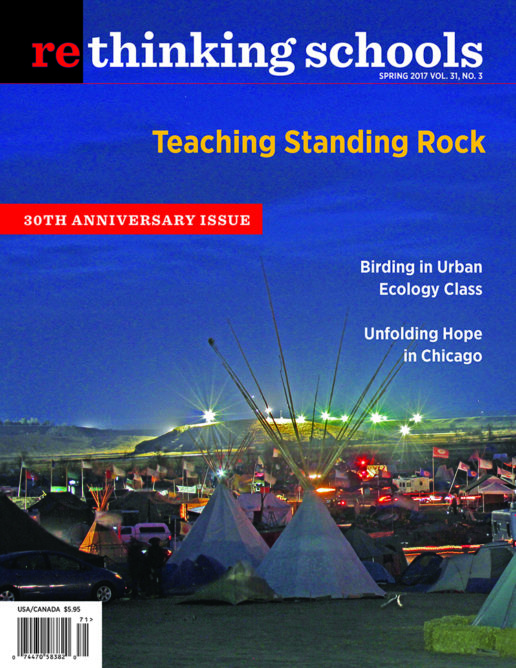Preview of Article:
Advocating for Arabic
An interview with Lara Kiswani
In San Francisco, there are a variety of different ways that non-English languages are taught, including dual-immersion programs, bilingual programs, and pull-out programs. Taken together, these are called language pathways. A few years ago, the Arab Resource & Organizing Center (AROC), Vietnamese Youth Development Center, and Arabic and Vietnamese-speaking parents in San Francisco successfully organized a campaign to advocate for the addition of Arabic and Vietnamese language pathways. Despite unanimous school board approval of the resolution, implementation has met obstacle after obstacle.
Lara Kiswani, executive director of AROC, talked with Rethinking Schools editor Jody Sokolower about the successful organizing effort and the ways that the Jewish Community Relations Council (JCRC), racism, and xenophobia have so far kept the Arabic and Vietnamese language pathways from being rolled out.
JODY SOKOLOWER: What is your own history with Arabic?
LARA KISWANI: Arabic is written in my history, identity, and culture. I was the first of my siblings to be born in the United States, and I was raised speaking both Arabic and English. I went to English-only schools, and I was put in English language learner classes because I spoke Arabic at home.
I learned a lot about my family history and our Palestinian culture in Arabic from my grandma, who lived with us as I was growing up. On Friday evenings I attended a community-run Arabic school, and on Sunday mornings I attended a community-led Islamic school to learn to read and recite the Quran. Since then, I have continued learning on my own. I can speak, read, and write Arabic, although not as well as I would like to.
JS: Did you learn enough academic Arabic to study at a university in an Arab country?
LK: No. Although I did learn classical Arabic, most of my Arabic is conversational. I can read classical Arabic, I can understand some, and speak and write even less. I don’t have a formalized knowledge of the language.
JS: Is that fairly typical of second-generation Arabic speakers in the United States?
LK: Most Arab American youth understand conversational Arabic, but can’t communicate in Arabic. Some can speak Arabic, but can’t write or read it. Others can read and write, but only conversational Arabic. They aren’t able to understand classical Arabic, so watching the news or reading a novel is really difficult.
Why Learn Arabic?
JS: Why is learning Arabic important, not just for kids from Arabic-speaking families?
LK: It’s obvious that the Arab region is of great interest to the world for political and economic reasons. This perpetuates a contradiction: the hyper visibility and invisibility that Arabs face in the United States. What is known about Arab people, history, and culture is often based on stereotypes and racist understandings of Arab people as the “other.” Otherwise, we as a people with a history and a living culture are not seen at all. What is seen is the devastation of our region, often at the hands of the United States and Israel, and the relationship of Western military, politicians, and aid workers to our region. There is little accurate understanding of the sociopolitical landscape of the Arab region. Learning Arabic is one window into that landscape. And it is a window into the Arab world from the viewpoint of those who live and breathe it.

